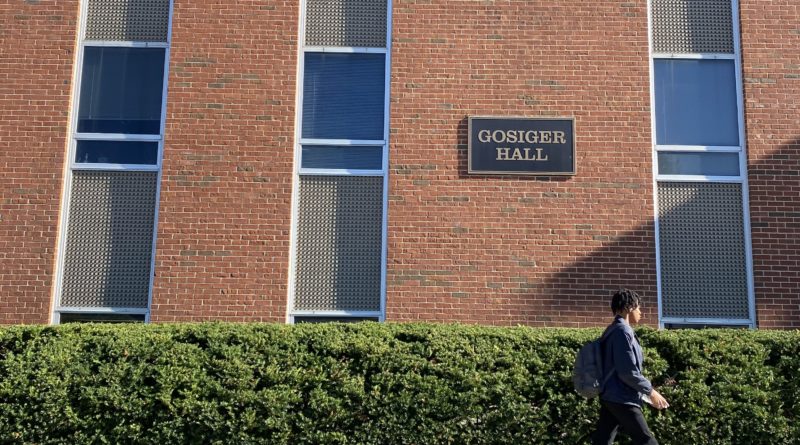UD Counseling Center battles recent losses, stigmas affecting mental health
UD’s Counseling Center is housed in Gossiger Hall, pictured above. Photo Courtesy of Maddy Bartsche, A&E editor.
Caroyln Scarpitti | Contributing Writer
The University of Dayton is working to do its part in combating students’ mental health struggles on its campus.
Based on a 2018 study conducted by the American College Health Association, “81.8 percent of students said they were moderately stressed or highly stressed.” The study also stated that not only were students found to be stressed, but “50.7 percent of them said they were experiencing moderate or serious psychological distress.” Despite this large number of distressed students, it found that, “only 28.3 percent of students reported receiving psychological or mental health services within the last 12 months.”
What could be preventing so many students from seeking professional help?
Talking to Brittany Corcoran, a licensed professional clinical counselor at UD’s Counseling Center, helped provide an understanding of the many factors that prevent students from seeking mental health services.
One of the most obvious reasons, according to Corcoran, is students at UD are so preoccupied with keeping up with school work, club participation and a social life, that it is easy to forget about caring for their mental health.
“UD students tend to be high-achieving, busy people,” Corcoran said. “Sometimes that results in being over-extended and their mental health and overall wellness are deprioritized.”
She highlighted students’ need for awareness that their self care and proper stress management are just as important for mental health as working out and eating right is for physical health.
In addition to this, students at UD, and all over the nation, face the barriers that are put in place by societal expectations and stigmas.
“Societal expectations dictate that we must be happy all the time, and if not we feel deficient,” Corcoran said. “Not only is it okay to not be happy all the time, but it is also completely normal.”
To further break down this expectation barrier, Corcoran said, “I want to normalize the students’ apprehension as well as their mental health concerns. I would let the students know everyone copes with mental health issues, and college is a time of transition and change.”
The Counseling Center provides students with a wide array of helpful resources that, when taken advantage of, can hugely benefit mental health, Corcoran said. In her first year as a counselor at UD, she has seen first-hand the benefits of students who are able to overcome these barriers.
“Many students I work with have learned new coping skills,” she said. “As a result, I have witnessed them feel more confident and capable of coping with their mental- health challenges.”
College is a time for new experiences, personal growth and having fun, and mental health challenges can indeed be a huge setback in allowing students to enjoy their college experience.
Although the first step of overcoming the internal or external barriers of seeking mental health services may be daunting, if students at UD are able to realize caring for their mental health through whatever means necessary is a normal and beneficial thing, the overall wellbeing and happiness of the student body can soar to new heights.
The recent losses of University of Dayton students have likely also heightened the need for support and counseling.
In an email to students, William M. Fischer, vice president for student development, said, “We recognize that losing someone can be difficult emotionally and incredibly tough to process. As grief is experienced in many different ways by individuals, we are sharing resources for students who may be struggling and need additional information. Or, if you know someone in need of help, please inform them about the resources available to them.”
Fischer guided students to UD’s Health and Wellbeing website.
As Corcoran shared, the UD Counseling Center is also an available space for students to seek support and take care of their mental health.
If you are in a crisis…
- During business hours: Contact the Counseling Center at 937-229-3141 or visit us in Gosiger Hall. Crisis appointments will be conducted in person, with very limited exceptions.
- After hours: Call Public Safety at 937-229-2121, the National Suicide Hotline at 1-800-273-8255, or text “Help” to 741741. For more crisis resources, follow this link.
To schedule a one-time appointment at the Counseling Center, follow this link.
To schedule an initial consultation in order to receive ongoing services, follow this link.
For more campus news like Flyer News on Facebook and follow us on Twitter (@FlyerNews) and Instagram (@flyernews).

